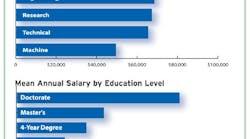By Steve Kuehn, Managing EditorTAKE A PICTURE OF yourself. Look at the photo. If you see a reasonably successful man in his mid 40s with a few more wrinkles and perhaps a little less hair, a keen look in his eye and a wry smile that says he's been through a lot but remains optimistic about his job, then you are the spitting image of the typical CONTROL DESIGN reader who responded to our fourth annual salary and job satisfaction survey.Granted, how "successful" one feels is entirely subjective, but salary is one aspect that most of us agree offers a common, bottom-line measure of our personal self-worth and professional prosperity. This year, respondents reported their median average annual salary was just over $71,000. Not surprisingly, that figure, in practical terms, is little changed from salary averages reported by our three prior surveys ('01: $67K; '02: $66K; '03: $72K).
Drill down a bit and average salary levels relative to industry segment reveal that for certain categories one's earning potential may be greater.For example, respondents reported the highest salaries were being paid in the printing trades, rolling mill machinery, industrial fans/blowers and semiconductor industries. Those categorizing themselves as engineering and systems integration specialists or I&C suppliers reported salaries well above the statistical mean as well. In the middle of the salary pack were folks reporting in from the industrial HVAC, engine and turbine, pumps and pumping equipment and packaging machinery industries.But, if you are in the air and gas compressor business, or working in the oil and gas field machinery industry somewhere in the middle of Texas and you find yourself thinking, "I'm making peanuts," then our data may back up your gut feeling. Respondents placing themselves in those categories reported the lowest average salaries of the entire group.Attitudes Shifting?
Since the survey's inception, respondents have been asked to gauge their level of job satisfaction. Compared to the last three years, this year's group had the largest portion of readers (28%) responding they were "very satisfied." And while the "fairly satisfied," "somewhat satisfied" and "disappointed" responses tended to be only marginally lower, the data does seem to suggest a shift to a more positive attitude about jobs and the industry is emerging among our readers as the industry slowly moves into better economic circumstances. If there is a positive trend to gauge here, it's helped by the fact that the majority responded positively to the job security question. The general tone of responders' comments were also sounding more upbeat and less repressed. Reading between the lines, it's easy to get a sense that people are feeling a little less discouraged and that the uncertainty and pessimism that so obviously pervaded last year's survey is beginning to fade.Weighing in with his silver-lining analysis was a "very satisfied," electrical engineer from Virginia who wrote "With the layoffs we have gone through, we now have a very lean but well-working team." A "very satisfied" veteran systems integrator from Colorado remarked that "Controls engineering can be fun and challenging," a happy sentiment echoed by an Ohio-based design engineer (with a combined salary and bonus below the tabulated salary average by the way) who offered this advice to someone contemplating entering the field: "I would highly recommend it. It is a good field, with ample opportunity and job security."
Since the survey's inception, respondents have been asked to gauge their level of job satisfaction. Compared to the last three years, this year's group had the largest portion of readers (28%) responding they were "very satisfied." And while the "fairly satisfied," "somewhat satisfied" and "disappointed" responses tended to be only marginally lower, the data does seem to suggest a shift to a more positive attitude about jobs and the industry is emerging among our readers as the industry slowly moves into better economic circumstances. If there is a positive trend to gauge here, it's helped by the fact that the majority responded positively to the job security question. The general tone of responders' comments were also sounding more upbeat and less repressed. Reading between the lines, it's easy to get a sense that people are feeling a little less discouraged and that the uncertainty and pessimism that so obviously pervaded last year's survey is beginning to fade.Weighing in with his silver-lining analysis was a "very satisfied," electrical engineer from Virginia who wrote "With the layoffs we have gone through, we now have a very lean but well-working team." A "very satisfied" veteran systems integrator from Colorado remarked that "Controls engineering can be fun and challenging," a happy sentiment echoed by an Ohio-based design engineer (with a combined salary and bonus below the tabulated salary average by the way) who offered this advice to someone contemplating entering the field: "I would highly recommend it. It is a good field, with ample opportunity and job security."
Mean Average Salary by Education LevelAnd while we're on that topic, concerns about job security seem to be abating among our readers as well. The portion of respondents answering "yes" to the question: "Are you concerned about job security," dropped from 54% last year to 47% in this year's responding group. A design engineer from Illinois offered a his view: "Job security and advancement are very limited in today's economy. However, I feel that will be changing soon."The Dark Side
Nevertheless, plenty of pessimists chimed in with comments from the dark side. To some, the glass will always be half empty, and these kinds of surveys are always a lightning rod for pent-up negative opinions. But having said that, such opinions remain valid nonetheless, and offer us a glimpse of the angst you and you colleagues may no doubt be feeling after several years of dramatic change and economic stress across all industries. Mean Annual Salary by Field of Study Although counting himself as "fairly satisfied," a respondent from the management ranks at a machine tool maker in New Jersey commented: "Given the unfair foreign competition allowed by government the future is bleak." Others mentioned they felt "commoditized," and expressed continuing dismay at the price they have had to pay personally to help keep the companies they work for profitable in the short term. What advice did the "disappointed" give to those contemplating entering the field? The answers ranged from a simple "don't" and "good luck" to more erudite warnings such as the one from an electrical engineer at a Connecticut-based systems integrator who advised: "Work in medical or some other such less-cyclic business where your work is appreciated and recognized." Is the grass really greener in medical? Several respondents thought so. Of all the comments received suggesting potential engineers consider an alternate career, "medical" was the only industry specifically identified as having the best prospects.This year's respondents were a diverse group, but not surprisingly EEs and MEs dominated percentage-wise. And while those reporting bachelor's degress and beyond command higher salaries, it's satisfying to note that Technical School alumni in this respondent group is reporting a higher average salary than last year (approximately $50,000). Who's in the "other" category? Respondents mention automation, engineering physics, and industrial and business management.Salary By Job Description
Nevertheless, plenty of pessimists chimed in with comments from the dark side. To some, the glass will always be half empty, and these kinds of surveys are always a lightning rod for pent-up negative opinions. But having said that, such opinions remain valid nonetheless, and offer us a glimpse of the angst you and you colleagues may no doubt be feeling after several years of dramatic change and economic stress across all industries. Mean Annual Salary by Field of Study Although counting himself as "fairly satisfied," a respondent from the management ranks at a machine tool maker in New Jersey commented: "Given the unfair foreign competition allowed by government the future is bleak." Others mentioned they felt "commoditized," and expressed continuing dismay at the price they have had to pay personally to help keep the companies they work for profitable in the short term. What advice did the "disappointed" give to those contemplating entering the field? The answers ranged from a simple "don't" and "good luck" to more erudite warnings such as the one from an electrical engineer at a Connecticut-based systems integrator who advised: "Work in medical or some other such less-cyclic business where your work is appreciated and recognized." Is the grass really greener in medical? Several respondents thought so. Of all the comments received suggesting potential engineers consider an alternate career, "medical" was the only industry specifically identified as having the best prospects.This year's respondents were a diverse group, but not surprisingly EEs and MEs dominated percentage-wise. And while those reporting bachelor's degress and beyond command higher salaries, it's satisfying to note that Technical School alumni in this respondent group is reporting a higher average salary than last year (approximately $50,000). Who's in the "other" category? Respondents mention automation, engineering physics, and industrial and business management.Salary By Job Description
Bullish on Engineering Engineers, however, will be engineers and this responding group of readers was no exception. When asked to give advice to newcomers considering the profession, they gave it, and true to form, in an honest and direct manner. A simple majority of commenting respondents offered well thought-out positive suggestions and practical career-path advice. From a mechanical engineer in Pennsylvania: "Learn to write and speak effectively. Learn to market and sell, and work with many different projects for diversification." An R&D engineer from the same state recommends expanding one's horizons: "Establish an understanding of the larger industry where your machine or services add value. Do not limit your focus just to your small piece of the pie." Good advice to be sure.Experience Trumps Youthful Exuberance
Among respondent's, nearly 70% are between 36 and 53 years of age. But experience counts for something: of the 10% indicating their age at 61+, average salary settled at $86,375. Generation-Next respondents (or whatever themarketing guys are calling 20-somethings these days) reported average salaries just below $50,000.No License? No Problem, But . . .
Licensed engineers reported they earn more. So while only about 20% of our survey's respondents indicatte they are licensed professional engineers, their average salary averaged more than $20,000 higher.The take away is this: Implicit in the range of helpful career advice commentary was a sense of just how bullish many respondents are this year regarding their chosen profession and the prospects for a successful career by those considering one. Saying it all, a thirty-something electrical engineer from a New York-based machine tool builder said, "Have a passion for technology, a desire to make a difference and take personal pride in every job you do. It is our job as controls engineers to find the productivity improvements that will save U.S. manufacturing."Amen to that brother.
Among respondent's, nearly 70% are between 36 and 53 years of age. But experience counts for something: of the 10% indicating their age at 61+, average salary settled at $86,375. Generation-Next respondents (or whatever themarketing guys are calling 20-somethings these days) reported average salaries just below $50,000.No License? No Problem, But . . .
Licensed engineers reported they earn more. So while only about 20% of our survey's respondents indicatte they are licensed professional engineers, their average salary averaged more than $20,000 higher.The take away is this: Implicit in the range of helpful career advice commentary was a sense of just how bullish many respondents are this year regarding their chosen profession and the prospects for a successful career by those considering one. Saying it all, a thirty-something electrical engineer from a New York-based machine tool builder said, "Have a passion for technology, a desire to make a difference and take personal pride in every job you do. It is our job as controls engineers to find the productivity improvements that will save U.S. manufacturing."Amen to that brother.




